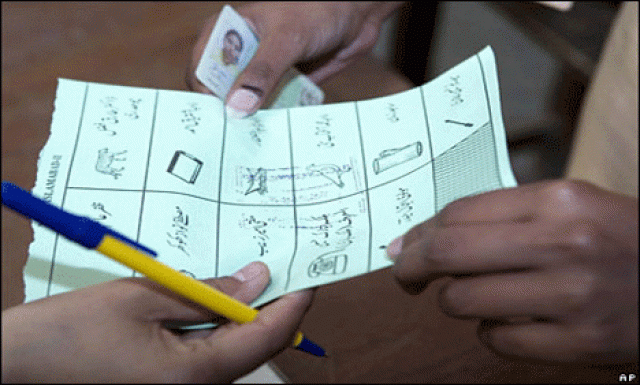Election process advances to scrutiny phase
28,626 candidates submit nomination papers for both national and provincial assemblies

The election process entered its second phase on Monday with the returning officers embarking upon the weeklong task of scrutinising the thousands of nomination papers filed during December 22-24 period for the National Assembly and the four provincial assemblies.
The process of scrutiny of the nomination papers would continue until December 30 after which the candidates could challenge the decisions of the returning officers, if any, in appellate tribunals until January 3, 2024, which would be decided by January 10, according to the election schedule.
Sunday was the last day of the extended deadline for filing the nomination papers. The Election Commission of Pakistan (ECP) released the data of papers, which showed that the number of candidates in this election is the highest ever in the country.
Overall 28,626 candidates for both national and provincial assemblies submitted their nomination papers – 7,913 for the 266 general seats of the National Assembly and 18,546 for the 593 general seats of the four provincial assemblies.
The numbers are way more than the nomination papers filed in the 2018 general elections. In the previous election five year ago a total of 21,482 nomination papers were submitted, including 5,473 for the general seats of the National Assembly.
In addition to the general seats, nomination papers were submitted for women and minority specific seats. According to the ECP data, 459 women have filed nomination papers for the 60 reserved seats for women in the National Assembly.
Additionally, 140 male and 10 female candidates are vying for the 10 minority seats. Apart from this, 358 nomination papers were submitted for three general and specific seats of the National Assembly from Islamabad.
A province-wise breakdown of the number showed that 208 candidates were contesting from Islamabad and 3,871 from Punjab for the National Assembly seats, compared with 2,700 candidates who submitted their nomination papers for the National Assembly seats from Punjab and Islamabad in 2018.
In Sindh in 2018, 1,346 candidates filed their nomination papers, while 1681 candidates were in the contest in the upcoming elections. A similar trend is witnessed in Khyber-Pakhtunkhwa (K-P), where the candidates for the February 8, 2024 election was 1,322 compared with 992 in 2018. In Balochistan 631 aspirants came forward to the National Assembly contest, while the number in 2018 was 435.
Read Unregistered, unheard: elections and transgender exclusion
According to the document, 9,029 candidates submitted nomination papers for the Punjab Assembly elections in contrast to 6,747 in 2018. For the Sindh Assembly the number rose from 3,636 in 2018 to 4,265. In Balochistan, 1,788 candidates submitted their nomination papers against 1,400 in 2018.
In K-P, 3,464 nomination were in the fray for the provincial assembly against 1,920 in the last election. In the last election, 436 papers were filed for the reserved seats for women in the National Assembly but this time, 459 nomination papers were filed.
Contrary to 1,255 papers in 2018, 1,365 women have submitted nomination papers for the reserved seats in provincial assemblies. Around 150 candidates submitted their nomination papers for the minority seats in the National Assembly.
Overall, 7,713 candidates submitted papers for the National Assembly seats, including 7,242 men and 471 women, while 17,744 candidates submitted their papers for the provincial assembly seats including 802 women candidates.
In Punjab, 8,592 men and 437 female candidates submitted nomination papers for provincial assembly seats. Similarly, 4,060 men and 205 women filed for the Sindh Assembly seats; 3349 men and 115 women for K-P Assembly; and 1,743 men and 45 women submitted papers for Balochistan Assembly.
Meanwhile the ECP collected a cumulative some of Rs655.547 million in fees for submitting the nomination papers by the aspiring candidates. The ECP had set a fee of Rs30,000 for submitting nomination papers for a National Assembly seat and Rs20,000 for a provincial assembly seat.
The amount included Rs249.39 million collected from National Assembly candidates -- Rs231.39 million from the candidates for general seats of the National Assembly; Rs13.77 million from the candidates for reserved seats for women and Rs4.5 million from minority seats candidates.
Over Rs406 million was received from the provincial assembly seats, including Rs379.2 on general seats, Rs27.3 million for women’s seats and over Rs7.8 million in fees from candidates for the reserved minorities seats in the provincial assemblies.
(WITH ADDITIONAL INPUT FROM USAMA IQBAL)



















COMMENTS
Comments are moderated and generally will be posted if they are on-topic and not abusive.
For more information, please see our Comments FAQ